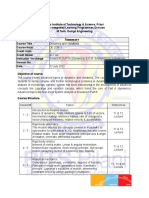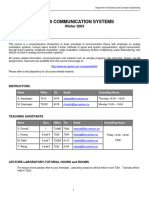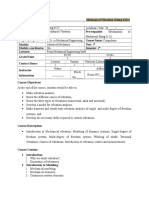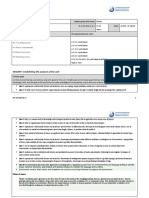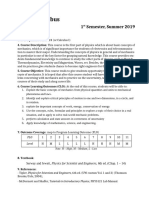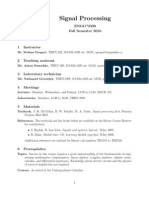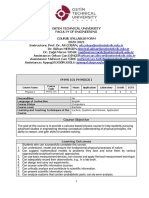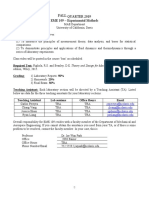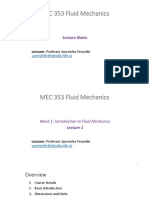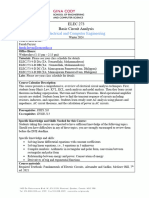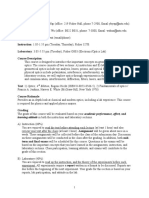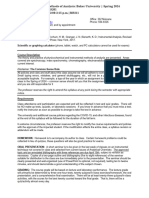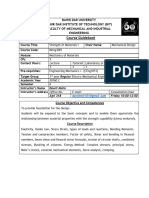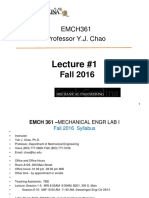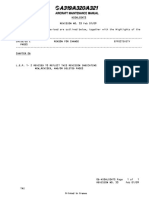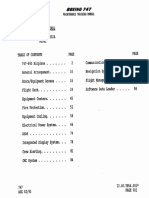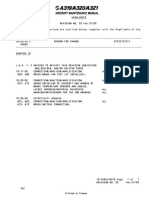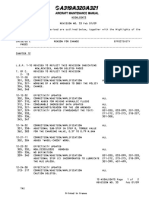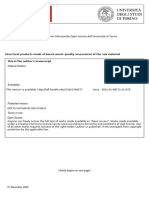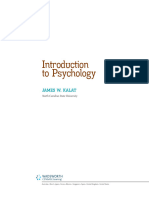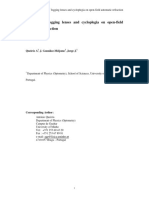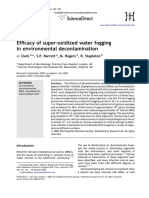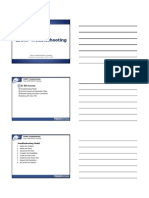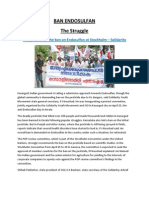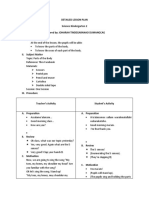Eml-4220 Fall20212
Eml-4220 Fall20212
Uploaded by
Mehrshad GhasemabadiCopyright:
Available Formats
Eml-4220 Fall20212
Eml-4220 Fall20212
Uploaded by
Mehrshad GhasemabadiOriginal Title
Copyright
Available Formats
Share this document
Did you find this document useful?
Is this content inappropriate?
Copyright:
Available Formats
Eml-4220 Fall20212
Eml-4220 Fall20212
Uploaded by
Mehrshad GhasemabadiCopyright:
Available Formats
VIBRATIONS
EML4220 Section 13422
Class Periods: Period 4 (10:40 AM - 11:30 AM)
Location: TUR 2306
Academic Term: Fall 2021
This syllabus may be modified during the semester. If this happens, students will be notified, and the revised
syllabus will be posted on the course web site.
Instructor:
Name: Youping Chen
Email Address: ypchen2@ufl.edu
Office Phone Number: (352)3928494
Office Hours: MWF, 5-6pm, zoom
Supervised Teaching Student:
• "Sun, Jiaqi" < sunjiaqi@ufl.edu>
Course Description
Free and forced vibrations, single and multiple degree of freedom systems, and applications to mechanical systems.
Credits: 3.
Course Pre-Requisites / Co-Requisites
Prereq: EGM 3344, EGM 3401, EGM 3520 and MAP 2302 with minimum grades of C.
Course Objectives
This course stresses fundamental engineering science and mathematical principles required for understanding of
vibrations. Students will (a) learn the concepts needed for understanding and analysis of the dynamic behavior of
vibrating systems, and (b) will develop skills for designing vibrating systems with desired properties that enhance
vibration when it is wanted and reduce vibration when it is unwanted. Upon completion of this course, students will
be able to
1) Generate simplified mechanics models for vibrating systems
2) Derive the equations of motion of single- and multiple-degree-of-freedom systems using mechanics
principles
3) Solve the equations using mathematical methods of ordinary differential equations and linear algebra
4) Analysis of the mathematical solutions to find natural frequencies of the systems and to predict the dynamic
responses of the systems to external excitations
5) Design mechanical systems with prescribed vibratory performance
Materials and Supply Fees
None
Professional Component (ABET):
EML 4220 supports several program outcomes enumerated in the Mission Statement of the Department of
Mechanical and Aerospace Engineering. Specific ME program outcomes supported by this course include: (1)
Apply knowledge of calculus based physics (ME Program Outcome M1); (2) Use knowledge of advanced
mathematics through differential equations and Linear algebra (ME Program Outcome M2 and M3). (4) Being able
to work professionally in the mechanical systems area (ME Program Outcome M4). Mathematical Sciences (40%),
Physical Sciences (20%), Engineering Sciences (40%)
Course Title, Prefix, and Number Page 1
Course Instructor and Academic Term
Relation to Program Outcomes (ABET):
The table below is an example. Please consult with your department’s ABET coordinator when filling this out.
Outcome Coverage*
1. An ability to identify, formulate, and solve complex High
engineering problems by applying principles of
mechanics and mathematics
2. An ability to apply engineering design to produce Low
solutions that meet specified needs with
consideration of public health, safety, and welfare,
as well as global, cultural, social, environmental,
and economic factors
3. An ability to communicate effectively with a range Low
of audiences
4. An ability to recognize ethical and professional Low
responsibilities in engineering situations and make
informed judgments, which must consider the
impact of engineering solutions in global,
economic, environmental, and societal contexts
5. An ability to function effectively on a team whose Low
members together provide leadership, create a
collaborative and inclusive environment, establish
goals, plan tasks, and meet objectives
6. An ability to develop and conduct appropriate Low
experimentation, analyze and interpret data, and
use engineering judgment to draw conclusions
7. An ability to acquire and apply new knowledge as Low
needed, using appropriate learning strategies
*Coverage is given as high, medium, or low. An empty box indicates that this outcome is not covered or
assessed in the course.
Required Textbooks and Software
• Title: Engineering Vibration
• Author: Daniel J. Inman
• Publication date and edition: 2014 3rd or 4th Edition
• ISBN number
(if course notes derived from various published sources are used, provide information above for each source)
(if course notes are developed by the instructor, so state)
Recommended Materials
• Title (will be posted on the course web site)
• Author
• Publication date and edition
• ISBN number
Course Title, Prefix, and Number Page 2
Course Instructor and Academic Term
Tentative Course Schedule (this may be modified in time)
Week Date Topic
1 1 Aug. 23 Introduction to the course
2 Aug. 25 Chapter 1, Free Vibration (8-9 lectures)
3 Aug. 27 Free Vibration step 3 & 4
4 2 Aug. 30 Free Vibration examples
5 Sep. 1 Free Vibration, Viscous damping
6 Sep. 3 Free Vibration, Viscous damping examples HW1 due
7 3 Sep. 8 Free Vibration, Stiffness
8 Sep. 10 Free Vibration, Application of vibrations to instruments and measurements
9 4 Sep. 13 Free Vibration, Stability
10 Sep. 15 Chapter 1 & HW 1 review HW2 due
11 Sep. 18 HW 2 and Practice exam review
12 5 Sep. 20 Exam 1
13 Sep. 22 Exam1 review/Chapter 2, Response to harmonic excitation (6-7 lectures)
14 Sep. 24 Response to harmonic excitation
6 Sep. 27 Career Fair/No class
15 Sep. 30 Response to harmonic excitation of damped system
16 Oct. 1 Response to harmonic excitation of damped system, base excitation
17 7 Oct. 4 Harmonic excitation of damped system, base excitation, rotating balance
18 Oct. 6 Measurement devices/accelerometer/seismometer HW3 due
19 8 Oct. 11 Review of chapter 3 and HW3
20 Oct. 13 Practice exam review
21 Oct. 15 Exam 2
22 9 Oct. 18 Exam2 review/Chapter 3, General force response, impulse response (6 lectures)
23 Oct. 20 General force response, impulse and step response
24 Oct. 22 General force response, step and ramp response
25 10 Oct. 25 General force response, periodic forces and Fourier theory
26 Oct. 27 General force response, arbitrary periodic force examples
27 Oct. 29 Fourier transform, stability HW4 due
28 11 Nov. 1 Laplace transform, shock spectrum
29 Nov. 3 Review of HW3
30 Nov. 5 Review of Chapter 3, Practice exam review,
31 12 Nov. 8 Exam 3
32 Nov. 10 Exam 3 review /Chapter 4 MDOF systems
33 Nov. 12 2DOF Eigenvalues and natural frequencies
34 13 Nov. 15 2DOF Modal analysis
35 Nov. 17 More than 2DOF
36 Nov. 19 Mode summation method
37 14 Nov. 22 Rigid body motion and modal analysis/systems with viscous damping
38 Nov. 23 Resonance, Modal analysis of forced response
39 15 Nov. 29 Examples HW5 due
40 Dec. 1 Vibration design
41 Dec. 3 Review of Chapter 4 and HW 5
42 16 Dec. 6 Review of Practice Exam
Dec. 8 Exam 4
or Dec. 17 7:30 am
Course Title, Prefix, and Number Page 3
Course Instructor and Academic Term
Online Course Recording
Our class sessions may be audio visually recorded for students in the class to refer back and for enrolled students
who are unable to attend live. Students who participate with their camera engaged or utilize a profile image are
agreeing to have their video or image recorded. If you are unwilling to consent to have your profile or video
image recorded, be sure to keep your camera off and do not use a profile image. Likewise, students who un-mute
during class and participate orally are agreeing to have their voices recorded. If you are not willing to consent to
have your voice recorded during class, you will need to keep your mute button activated and communicate
exclusively using the "chat" feature, which allows students to type questions and comments live. The chat will not
be recorded or shared. As in all courses, unauthorized recording and unauthorized sharing of recorded materials
is prohibited.
Attendance Policy, Class Expectations, and Make-Up Policy
Class attendance (in person or online) is expected, but not required. Participation is, however, required. If you must
miss a lecture for any reason, you should obtain the lecture notes from another student or watch the recorded lecture
if available. Students will be held responsible for knowledge of all scheduling and policy announcements made in
class or on course website. Make-up exams, assignments, and other work in this course are consistent with university
policies. Click here to read the university attendance policies:
https://catalog.ufl.edu/UGRD/academic-regulations/attendance-policies/
Evaluation of Grades
Assignment Total Points Percentage of Final Grade
Homework Sets (5) 100 each 20%
Participation 100 5%
Exam 1 100 20%
Exam 2 100 15%
Exam 3 100 15%
Exam 4 100 25%
100%
• Late homework will be deducted 20% per day.
• Solutions will be posted on class web site
Grading Policy
Percent Grade Grade
Points
93.4 - 100 A 4.00
90.0 - 93.3 A- 3.67
86.7 - 89.9 B+ 3.33
83.4 - 86.6 B 3.00
80.0 - 83.3 B- 2.67
76.7 - 79.9 C+ 2.33
73.4 - 76.6 C 2.00
70.0 - 73.3 C- 1.67
66.7 - 69.9 D+ 1.33
63.4 - 66.6 D 1.00
60.0 - 63.3 D- 0.67
0 - 59.9 E 0.00
Honorlock:
Consistent with University of Florida policy, Honorlock will be used for the exams. Please see the following link:
https://distance.ufl.edu/proctoring/ for more information.
Course Title, Prefix, and Number Page 4
Course Instructor and Academic Term
More information on UF grading policy may be found at:
https://catalog.ufl.edu/ugrad/current/regulations/info/grades.aspx
Students Requiring Accommodations
Students with disabilities who experience learning barriers and would like to request academic accommodations
should connect with the disability Resource Center by visiting https://disability.ufl.edu/students/get-started/. It is
important for students to share their accommodation letter with their instructor and discuss their access needs, as
early as possible in the semester.
Course Evaluation
Students are expected to provide professional and respectful feedback on the quality of instruction in this course by
completing course evaluations online via GatorEvals. Guidance on how to give feedback in a professional and
respectful manner is available at https://gatorevals.aa.ufl.edu/students/. Students will be notified when the
evaluation period opens, and can complete evaluations through the email they receive from GatorEvals, in their
Canvas course menu under GatorEvals, or via https://ufl.bluera.com/ufl/. Summaries of course evaluation results
are available to students at https://gatorevals.aa.ufl.edu/public-results/.
In-Class Recording
Students are allowed to record video or audio of class lectures. However, the purposes for which these recordings
may be used are strictly controlled. The only allowable purposes are (1) for personal educational use, (2) in
connection with a complaint to the university, or (3) as evidence in, or in preparation for, a criminal or civil
proceeding. All other purposes are prohibited. Specifically, students may not publish recorded lectures without the
written consent of the instructor.
A “class lecture” is an educational presentation intended to inform or teach enrolled students about a particular
subject, including any instructor-led discussions that form part of the presentation, and delivered by any instructor
hired or appointed by the University, or by a guest instructor, as part of a University of Florida course. A class
lecture does not include lab sessions, student presentations, clinical presentations such as patient history,
academic exercises involving solely student participation, assessments (quizzes, tests, exams), field trips, private
conversations between students in the class or between a student and the faculty or lecturer during a class session.
Publication without permission of the instructor is prohibited. To “publish” means to share, transmit, circulate,
distribute, or provide access to a recording, regardless of format or medium, to another person (or persons),
including but not limited to another student within the same class section. Additionally, a recording, or transcript of
a recording, is considered published if it is posted on or uploaded to, in whole or in part, any media platform,
including but not limited to social media, book, magazine, newspaper, leaflet, or third party note/tutoring services.
A student who publishes a recording without written consent may be subject to a civil cause of action instituted by
a person injured by the publication and/or discipline under UF Regulation 4.040 Student Honor Code and Student
Conduct Code.
Use of Live Zoom (HyFlex)
In light of the challenge of the pandemic, the instructor may live stream to those who are sick or just quarantining.
Associated recordings may be made. Regarding associated details, the instructor will update the class throughout
the semester.
University Honesty Policy
UF students are bound by The Honor Pledge which states, “We, the members of the University of Florida community,
pledge to hold ourselves and our peers to the highest standards of honor and integrity by abiding by the Honor Code.
On all work submitted for credit by students at the University of Florida, the following pledge is either required or
implied: “On my honor, I have neither given nor received unauthorized aid in doing this assignment.” The Honor
Code (https://sccr.dso.ufl.edu/policies/student-honor-code-student-conduct-code/) specifies a number of
behaviors that are in violation of this code and the possible sanctions. Furthermore, you are obligated to report any
Course Title, Prefix, and Number Page 5
Course Instructor and Academic Term
condition that facilitates academic misconduct to appropriate personnel. If you have any questions or concerns,
please consult with the instructor in this class.
Commitment to a Safe and Inclusive Learning Environment
The Herbert Wertheim College of Engineering values broad diversity within our community and is committed to
individual and group empowerment, inclusion, and the elimination of discrimination. It is expected that every
person in this class will treat one another with dignity and respect regardless of gender, sexuality, disability, age,
socioeconomic status, ethnicity, race, and culture.
If you feel like your performance in class is being impacted by discrimination or harassment of any kind, please
contact your instructor or any of the following:
• Your academic advisor or Undergraduate Program Coordinator: advising@mae.ufl.edu
• Jennifer Nappo, Director of Human Resources, 352-392-0904, jpennacc@ufl.edu
• Curtis Taylor, Associate Dean of Student Affairs, 352-392-2177, taylor@eng.ufl.edu
• Toshikazu Nishida, Associate Dean of Academic Affairs, 352-392-0943, nishida@eng.ufl.edu
Software Use
All faculty, staff, and students of the University are required and expected to obey the laws and legal agreements
governing software use. Failure to do so can lead to monetary damages and/or criminal penalties for the individual
violator. Because such violations are also against University policies and rules, disciplinary action will be taken as
appropriate. We, the members of the University of Florida community, pledge to uphold ourselves and our peers to
the highest standards of honesty and integrity.
Student Privacy
There are federal laws protecting your privacy with regards to grades earned in courses and on individual
assignments. For more information, please see: https://registrar.ufl.edu/ferpa.html
Campus Resources:
Health and Wellness
U Matter, We Care:
Your well-being is important to the University of Florida. The U Matter, We Care initiative is committed to
creating a culture of care on our campus by encouraging members of our community to look out for one another
and to reach out for help if a member of our community is in need. If you or a friend is in distress, please contact
umatter@ufl.edu so that the U Matter, We Care Team can reach out to the student in distress. A nighttime and
weekend crisis counselor is available by phone at 352-392-1575. The U Matter, We Care Team can help connect
students to the many other helping resources available including, but not limited to, Victim Advocates, Housing
staff, and the Counseling and Wellness Center. Please remember that asking for help is a sign of strength. In case
of emergency, call 9-1-1.
Counseling and Wellness Center: https://counseling.ufl.edu, and 392-1575; and the University Police
Department: 392-1111 or 9-1-1 for emergencies.
Sexual Discrimination, Harassment, Assault, or Violence
If you or a friend has been subjected to sexual discrimination, sexual harassment, sexual assault, or violence
contact the Office of Title IX Compliance, located at Yon Hall Room 427, 1908 Stadium Road, (352) 273-1094,
title-ix@ufl.edu
Sexual Assault Recovery Services (SARS)
Student Health Care Center, 392-1161.
University Police Department at 392-1111 (or 9-1-1 for emergencies), or http://www.police.ufl.edu/.
Course Title, Prefix, and Number Page 6
Course Instructor and Academic Term
COVID-19
• You are expected to wear approved face coverings at all times during class and within buildings even if
you are vaccinated.
• If you are sick, stay home and self-quarantine. Please visit the UF Health Screen, Test & Protect website
about next steps, retake the questionnaire and schedule your test for no sooner than 24 hours after your
symptoms began. Please call your primary care provider if you are ill and need immediate care or the UF
Student Health Care Center at 352-392-1161 (or email covid@shcc.ufl.edu) to be evaluated for testing and
to receive further instructions about returning to campus.
• If you are withheld from campus by the Department of Health through Screen, Test & Protect, you are not
permitted to use any on campus facilities. Students attempting to attend campus activities when withheld
from campus will be referred to the Dean of Students Office.
• UF Health Screen, Test & Protect offers guidance when you are sick, have been exposed to someone who
has tested positive or have tested positive yourself. Visit the UF Health Screen, Test & Protect website for
more information.
• Please continue to follow healthy habits, including best practices like frequent hand washing. Following
these practices is our responsibility as Gators.
• Consistent with UF policy: "If a student is absent from classes or examinations because of illness, they
should contact their instructors."
Academic Resources
E-learning technical support, 352-392-4357 (select option 2) or e-mail to Learning-support@ufl.edu.
https://lss.at.ufl.edu/help.shtml.
Career Resource Center, Reitz Union, 392-1601. Career assistance and counseling. https://www.crc.ufl.edu/.
Library Support, http://cms.uflib.ufl.edu/ask. Various ways to receive assistance with respect to using the
libraries or finding resources.
Teaching Center, Broward Hall, 392-2010 or 392-6420. General study skills and tutoring.
https://teachingcenter.ufl.edu/.
Writing Studio, 302 Tigert Hall, 846-1138. Help brainstorming, formatting, and writing papers.
https://writing.ufl.edu/writing-studio/.
Student Complaints Campus: https://care.dso.ufl.edu.
On-Line Students Complaints: http://www.distance.ufl.edu/student-complaint-process.
Course Title, Prefix, and Number Page 7
Course Instructor and Academic Term
You might also like
- CVC 302 ManualDocument176 pagesCVC 302 ManualMazda62006100% (5)
- A Petroleum Geologist's Guide to Seismic ReflectionFrom EverandA Petroleum Geologist's Guide to Seismic ReflectionRating: 5 out of 5 stars5/5 (1)
- De ZG611 Course HandoutDocument7 pagesDe ZG611 Course HandoutpanyamnrNo ratings yet
- Course Details-Mechanical VibrationDocument6 pagesCourse Details-Mechanical Vibrationbereket gNo ratings yet
- Fall2024 - Course Syllabus - Phye112LDocument2 pagesFall2024 - Course Syllabus - Phye112Lnsynk1357No ratings yet
- ELEC4621 Advanced Digital Signal Processing: Course StaffDocument9 pagesELEC4621 Advanced Digital Signal Processing: Course Staffprasanna prasannaNo ratings yet
- Bmed 3510 Syllabus s15Document4 pagesBmed 3510 Syllabus s15Sulaiman SomaniNo ratings yet
- CHM 309 March 2021Document124 pagesCHM 309 March 2021Faruq MayourwaNo ratings yet
- De ZG611 Course HandoutDocument4 pagesDe ZG611 Course HandoutMeghaBishtNo ratings yet
- 2016@ Course Guide Antennas and Radio Wave PropagationDocument6 pages2016@ Course Guide Antennas and Radio Wave PropagationZemenu BelieNo ratings yet
- Columbia University Chen Syllabus - Advanced - KineticsDocument4 pagesColumbia University Chen Syllabus - Advanced - KineticsJaysonn KayNo ratings yet
- MATH291Document8 pagesMATH291mNo ratings yet
- Cmi w03Document4 pagesCmi w03Mohmmed AbdallhNo ratings yet
- 2012-2013 ME4Q03-6Q03 VeldhuisDocument2 pages2012-2013 ME4Q03-6Q03 VeldhuisnimasolhjooNo ratings yet
- Fluid Mechanics 1 Course PlanDocument6 pagesFluid Mechanics 1 Course PlanMuhammad Bin ZubairNo ratings yet
- Course Outline DJJ2093 PDFDocument3 pagesCourse Outline DJJ2093 PDFZariff AnizanNo ratings yet
- Summary of Information On Each Course/ModuleDocument4 pagesSummary of Information On Each Course/ModuleBlackk WorldzNo ratings yet
- Lahore University of Management Sciences EE538: Photonics FundamentalsDocument2 pagesLahore University of Management Sciences EE538: Photonics FundamentalsWaleed KhalidNo ratings yet
- Course Status: Compulsory Year: 3 Semester: 6: RD THDocument3 pagesCourse Status: Compulsory Year: 3 Semester: 6: RD THtibemNo ratings yet
- NEW - UPDATED Course OutlineDocument9 pagesNEW - UPDATED Course Outlineabukimiftah18No ratings yet
- 3CS501CC24 DAA Course Policy 24 25Document33 pages3CS501CC24 DAA Course Policy 24 25terehog989No ratings yet
- Een1046 Course Information 1011Document3 pagesEen1046 Course Information 1011Gm Fairuz ShahNo ratings yet
- DP1 Unit Planner Topic 4Document23 pagesDP1 Unit Planner Topic 4Mona Mohamed Safwat100% (1)
- CoursePolicy PHYS1410 F19Document7 pagesCoursePolicy PHYS1410 F19Anna KuznetsovaNo ratings yet
- MENG1003 Course Descriptor (1) - 54645703Document7 pagesMENG1003 Course Descriptor (1) - 54645703Gregory CameraNo ratings yet
- PHYS030Document9 pagesPHYS030mNo ratings yet
- Transport PhenomenaDocument8 pagesTransport Phenomenatarikus893No ratings yet
- Syllabus (23-2) RF회로설계Document5 pagesSyllabus (23-2) RF회로설계Valérie NguyenNo ratings yet
- Che F311 Kinetics Reactor Design - HandoutDocument2 pagesChe F311 Kinetics Reactor Design - HandoutAzureNo ratings yet
- Engineering Physics (Sc19102) Version 3Document7 pagesEngineering Physics (Sc19102) Version 3AbhishekNo ratings yet
- General PhysicsDocument5 pagesGeneral Physicsanwar abdurezakNo ratings yet
- Physics 121 SyllabusDocument6 pagesPhysics 121 SyllabusHuu Cao XuanNo ratings yet
- Engg3390 2010fDocument4 pagesEngg3390 2010fStefano Gregori0% (1)
- Physics I 1 3 0 2 4 6 No English Compulsory Bachelor Lecture, Question and Answer, ApplicationDocument4 pagesPhysics I 1 3 0 2 4 6 No English Compulsory Bachelor Lecture, Question and Answer, ApplicationmelihNo ratings yet
- Phy 455Document112 pagesPhy 455doghorNo ratings yet
- EME 109 SyllabusDocument10 pagesEME 109 SyllabusSteelcoverNo ratings yet
- ECO 401 Econometrics: SI 2021 Week 1, 7 SeptemberDocument65 pagesECO 401 Econometrics: SI 2021 Week 1, 7 SeptemberJerry ma100% (1)
- MEC 353 Fluid Mechanics: Lecture NotesDocument470 pagesMEC 353 Fluid Mechanics: Lecture NotesbaderNo ratings yet
- ELEC 273 - Course Outline - W24Document7 pagesELEC 273 - Course Outline - W24Alexandros HadjinicolaouNo ratings yet
- PH3210 Optics: Edition, Eugene Hecht (ISBN 0-8053-8566-5), 2) Fundamentals of OpticsDocument3 pagesPH3210 Optics: Edition, Eugene Hecht (ISBN 0-8053-8566-5), 2) Fundamentals of OpticsStephany Perdomo OspinoNo ratings yet
- General Physics SylabusDocument5 pagesGeneral Physics SylabusTadesse AbateNo ratings yet
- Course Outline: Meng6302 Advanced Mechanics of SolidsDocument7 pagesCourse Outline: Meng6302 Advanced Mechanics of SolidsKKDhNo ratings yet
- Syllabus For Che 3400Document4 pagesSyllabus For Che 3400ssavage03No ratings yet
- 2b.course Delivery Plan - SampleDocument11 pages2b.course Delivery Plan - SampleArunkuma81No ratings yet
- PH102 Course Outline 2023Document9 pagesPH102 Course Outline 2023KAUSHAL KEVINNo ratings yet
- Course Outline Winter 2024 - WDocument4 pagesCourse Outline Winter 2024 - Wvi.nossovaNo ratings yet
- Course Syllabus Physical CheDocument7 pagesCourse Syllabus Physical CheOsama MohsinNo ratings yet
- ELEC275 CourseOutline Summer2024Document5 pagesELEC275 CourseOutline Summer2024vi.nossovaNo ratings yet
- School of Engineering: MENG470 - Internal Combustion EnginesDocument9 pagesSchool of Engineering: MENG470 - Internal Combustion EnginesMohammed KawashNo ratings yet
- CH341 SP 24Document5 pagesCH341 SP 24j perryNo ratings yet
- RPS Sensor and ActuatorDocument4 pagesRPS Sensor and ActuatorARIF SURTONONo ratings yet
- Coordination Form & Teaching Plan: Subject InformationDocument7 pagesCoordination Form & Teaching Plan: Subject InformationJoshua ChongNo ratings yet
- 1.0 Course Outline Mechanics Me 103 OriginalDocument4 pages1.0 Course Outline Mechanics Me 103 Originalkundayi shavaNo ratings yet
- Course GuideBook - StrengthOfMaterials - ElectroMechDocument3 pagesCourse GuideBook - StrengthOfMaterials - ElectroMechabrhamteddy14No ratings yet
- Lecture 1Document14 pagesLecture 1Icy45No ratings yet
- Mod TA 220-1Document9 pagesMod TA 220-1Muhammed Azeem RehmanNo ratings yet
- Debre Tabor University: Faculty of TechnologyDocument10 pagesDebre Tabor University: Faculty of TechnologyVenkata DineshNo ratings yet
- PHYS1005 - Applied Engineering Physics IDocument6 pagesPHYS1005 - Applied Engineering Physics IChristiana SukhuNo ratings yet
- Thermodynamics SyllabusDocument4 pagesThermodynamics Syllabusalexcittadini01100% (1)
- 2017-S1 CVEN9802x2763Document3 pages2017-S1 CVEN9802x2763IgorNo ratings yet
- Nammtiaa 000004Document239 pagesNammtiaa 000004Mehrshad GhasemabadiNo ratings yet
- 01 GeneralDocument26 pages01 GeneralMehrshad GhasemabadiNo ratings yet
- 10 1109@rast 2019 8767827Document7 pages10 1109@rast 2019 8767827Mehrshad GhasemabadiNo ratings yet
- Nammtiaa 000008Document174 pagesNammtiaa 000008Mehrshad GhasemabadiNo ratings yet
- Nammtiaa 000010Document1,356 pagesNammtiaa 000010Mehrshad GhasemabadiNo ratings yet
- Civalek 2021Document17 pagesCivalek 2021Mehrshad GhasemabadiNo ratings yet
- Carrera 2013Document9 pagesCarrera 2013Mehrshad GhasemabadiNo ratings yet
- EJWWP Post PrintDocument18 pagesEJWWP Post PrintMehrshad GhasemabadiNo ratings yet
- ContentsDocument12 pagesContentsMehrshad GhasemabadiNo ratings yet
- Nlewis65,+256 265 Microbiographies Bird 35 No 4 FALL 2001 CEEDocument10 pagesNlewis65,+256 265 Microbiographies Bird 35 No 4 FALL 2001 CEEMehrshad GhasemabadiNo ratings yet
- Prilleltensky Psychology andDocument349 pagesPrilleltensky Psychology andMehrshad GhasemabadiNo ratings yet
- 8291 Suggested Resources ListDocument4 pages8291 Suggested Resources ListMehrshad GhasemabadiNo ratings yet
- Macleod - Et - Al. 2021Document15 pagesMacleod - Et - Al. 2021Mehrshad GhasemabadiNo ratings yet
- Influence of Fogging Lenses and Cycloplegia On Open-Field Automatic RefractionDocument20 pagesInfluence of Fogging Lenses and Cycloplegia On Open-Field Automatic RefractionMehrshad GhasemabadiNo ratings yet
- Efficacy of Super-Oxidized Water Fogging in Environmental DecontaminatioDocument5 pagesEfficacy of Super-Oxidized Water Fogging in Environmental DecontaminatioMehrshad GhasemabadiNo ratings yet
- FT 133Document6 pagesFT 133Mehrshad GhasemabadiNo ratings yet
- Control Handbook RotkowitzDocument10 pagesControl Handbook RotkowitzMehrshad GhasemabadiNo ratings yet
- Kovats Hajat 2008 Heat Stress and Public Health A Critical ReviewDocument20 pagesKovats Hajat 2008 Heat Stress and Public Health A Critical ReviewMehrshad GhasemabadiNo ratings yet
- B935Document5 pagesB935Mehrshad GhasemabadiNo ratings yet
- FourierDocument34 pagesFourierMehrshad GhasemabadiNo ratings yet
- Wish List of Items For Soldier Care PackagesDocument4 pagesWish List of Items For Soldier Care PackagesMichelle TaylorNo ratings yet
- G+2 NewDocument1 pageG+2 New39 - Deep MandokarNo ratings yet
- Activity N°2 - School PlacesDocument11 pagesActivity N°2 - School PlacesMarian SofíaNo ratings yet
- Ug903 Vivado Using ConstraintsDocument152 pagesUg903 Vivado Using ConstraintsJenniferNo ratings yet
- G2 - Coastal Activities Offered by Tondol Beach in Anda, PangasinanDocument58 pagesG2 - Coastal Activities Offered by Tondol Beach in Anda, Pangasinaneuniceclaudio17No ratings yet
- Problem Solving Using IRACDocument9 pagesProblem Solving Using IRACthroux100% (1)
- Research On Airport Security Based On Virtual Queuing TheoryDocument5 pagesResearch On Airport Security Based On Virtual Queuing TheorySunil SagarNo ratings yet
- 7.modeling BaseflowDocument4 pages7.modeling Baseflowsugendengal100% (1)
- EIGRP Troubleshooting: Cisco CCNP ROUTE TrainingDocument12 pagesEIGRP Troubleshooting: Cisco CCNP ROUTE TrainingjosephjoNo ratings yet
- Predictors ATLS FailureDocument6 pagesPredictors ATLS FailureKing DonNo ratings yet
- MN 7 038 2Document28 pagesMN 7 038 2Valrik IIINo ratings yet
- Mack MP7, MP8, MP10 Engines Overhaul Part Numbers Reference Guide Vol 16013B MACKDocument2 pagesMack MP7, MP8, MP10 Engines Overhaul Part Numbers Reference Guide Vol 16013B MACKviemey1952100% (2)
- Solidarity and EndosulfanDocument22 pagesSolidarity and EndosulfanbaskanjirNo ratings yet
- Monetary PolicyDocument13 pagesMonetary PolicyAppan Kandala VasudevacharyNo ratings yet
- SumerDocument16 pagesSumerJuneyell Escobar100% (1)
- String TheoryDocument5 pagesString TheoryDarshan M MNo ratings yet
- Acetona Niosh 1300 PDFDocument5 pagesAcetona Niosh 1300 PDFOscar Garcia GutierrezNo ratings yet
- CCPP ID: Not Assigned: Basic InformationDocument2 pagesCCPP ID: Not Assigned: Basic InformationAmresh PattnaikNo ratings yet
- Adobe Scan 23 Feb 2022Document1 pageAdobe Scan 23 Feb 2022ankita shreepadNo ratings yet
- Chapter 1 DCC5152Document35 pagesChapter 1 DCC5152Nora Ismail67% (9)
- Moot Cases ListDocument3 pagesMoot Cases ListadityatnnlsNo ratings yet
- Inert Gas SystemDocument9 pagesInert Gas Systemdj22500100% (3)
- KTR Kat99pp01 Coupling GuardDocument20 pagesKTR Kat99pp01 Coupling Guardmoorthymech1979100% (1)
- Floating Solar PlantDocument4 pagesFloating Solar PlantAjay Chacko100% (1)
- Impact of Online Advertising On Consumers Buying Behaviour: A Study With Reference To Karkala TalukDocument5 pagesImpact of Online Advertising On Consumers Buying Behaviour: A Study With Reference To Karkala TalukbobNo ratings yet
- Fan Impeller Concept DesignDocument15 pagesFan Impeller Concept DesignLucky Cham AguilaNo ratings yet
- Detailed Lesson Plan Science Kindergarten 2 Prepared By: Joharah Tindegaranao Dumangcag I. ObjectivesDocument4 pagesDetailed Lesson Plan Science Kindergarten 2 Prepared By: Joharah Tindegaranao Dumangcag I. ObjectivesJoharah DumangcagNo ratings yet
- EC1313 Two Marks Linear Integrated CircuitsDocument11 pagesEC1313 Two Marks Linear Integrated Circuitsmoney_kandan2004No ratings yet
- Module 5B - Titration Curves For Polyfunctional Acids and BasesDocument4 pagesModule 5B - Titration Curves For Polyfunctional Acids and BasesRonald DonaldNo ratings yet


